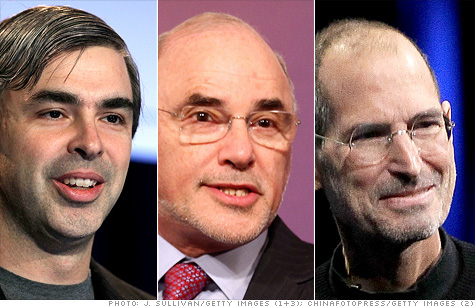
Google's CEO Larry Page (left), HP's CEO Leo Apotheker (center) and Apple's chairman Steve Jobs all took the tech industry for a ride in August.
NEW YORK (CNNMoney) -- While an earthquake and a hurricane slammed the East Coast in August, the West Coast endured a different kind of turmoil.
Within a 10-day span this past month, Google reinvented itself as a hardware company, Hewlett-Packard moved to ditch PCs and become a software company, and Apple lost its iconic CEO.
The three Silicon Valley Goliaths now face transitions that will reshape the technology landscape.
"We're being knocked off our axis here," said Laura DiDio, principal of research firm ITIC. "What's happening now would have been unthinkable just a month ago."
First came Google (GOOG, Fortune 500), announcing on Aug. 15 that it would be acquiring Motorola Mobility (MMI). The company has long touted the benefits of open-source software, yet here it was threatening its smartphone partners by buying a handset manufacturer. Pending regulatory approval, Google will begin making its own devices, just like Apple and Research In Motion (RIMM) do -- the companies Google eclipsed with its Android operating system.
HP (HPQ, Fortune 500) is the nation's biggest technology company and the world's largest personal computer maker, but it announced Aug. 18 that it is seeking to spin off its PC division to focus instead of software and services.
It was an about-face for a company that splurged on Compaq a decade earlier, using that foundation to make its PC business into the industry's most successful. HP's PC sales are almost double the annual revenue of its next largest competitor, Dell (DELL, Fortune 500).
Less than a week later, on Aug. 24, Apple (AAPL, Fortune 500) announced that Steve Jobs had resigned as CEO. Jobs had been on medical leave since January, but the news still sent shockwaves throughout the technology industry.
Though Apple will hardly be rudderless without Jobs, the company's co-founder has a unique genius that will be hard to replace: Jobs launched hit after hit, somehow knowing what consumers wanted before they knew they wanted it.
These kind of major disruptions happen from time to time -- but they can topple giants. Before the PC boom, no one had heard of Microsoft (MSFT, Fortune 500), and RCA was among the biggest consumer electronics retailers.
"A few decades ago, cheap PCs and fast processors created a number of companies out of nothing," said Zeus Kerravala, analyst at Yankee Group. "We're going through something similar now. With mobile and wireless, we're seeing a transition again. Companies are positioning themselves and gathering up the necessary assets."
The ripple effects are already visible.
Samsung is widely believed to be eying webOS, which HP is looking to sell off. Why? Because Samsung is a Google partner that relies on the Android operating system, and the Motorola acquisition is a threat to its business.
IBM (IBM, Fortune 500) and Oracle (ORCL, Fortune 500) suddenly have to pay closer attention to HP, which shifts from a hardware partner of theirs to a potential direct rival in the software and services business.
Meanwhile, everyone is watching new Apple CEO Tim Cook for signs of how his leadership will differ from his predecessor's. Apple's influence extends beyond the tech industry -- it's also a key player in the music, publishing and wireless fields. And it's Innovator #1 in the consumer-gadgets market.
"Steve Jobs doesn't just drive Apple," said Rob Enderle, president of Enderle Group, a tech consultancy. "He has been driving the PC, tablet, and smartphone markets for a number of years."
Who will lead the way now?